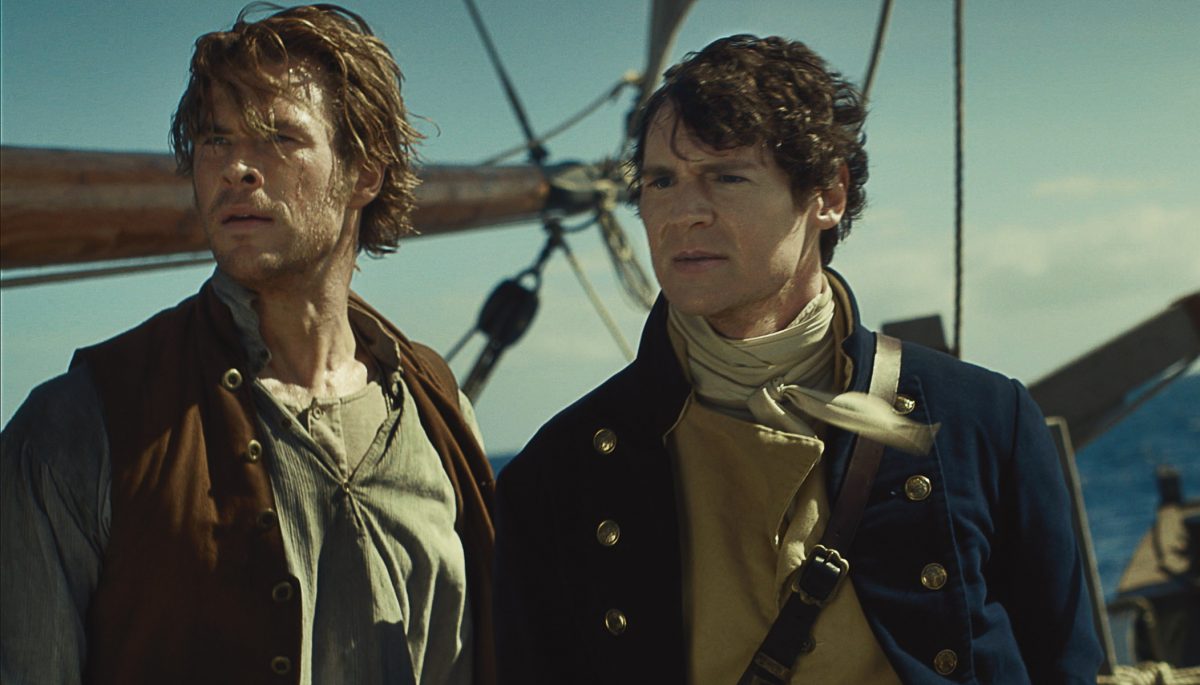
Ron Howard films are often (justifiably) criticized for being too schmaltzy, for his reliance on his director’s bag of tricks (swelling music; reaction shots of relieved loved ones) to lay on the emotions too thick. So I’m a bit surprised to report that Howard’s latest, In the Heart of the Sea, left me a bit cold. It’s sturdy, watchable, competently mounted, of course—Howard is nothing if not a pro—but except for the visuals, which can be quite stunning, it never roused me. Strange because the subject matter practically begs for emotional crescendos.
The film, we’re told, is based on the true story behind the Herman Melville novel Moby Dick. When it first starts, we meet Melville (Ben Whishaw), who is willing to pay the last living crewmember of the Essex whaling ship all the money he has to hear the story of the ship’s tragic encounter with the great white whale. The crewmember, whose name is Thomas and who is played with a halo of melancholy around him by Brendan Gleeson, is reluctant to share his story—he never talks about it, for reasons that will soon make themselves clear. But coaxed on by his wife (Michelle Fairley), he begins to unburden himself.
Now we flash back some 40 years earlier, when Thomas was just a young lad (played by Tom Holland), an orphan, on his very first whaling expedition, hoping to get one of the whale’s teeth the other fishermen have proudly dangling from their necks. The ship’s first-time captain, George Pollard (Benjamin Walker), is a man of privilege who comes from a long line of New England sea-men. His first mate—and our hero—is the tough, skilled, and slightly bitter Owen Chase (Chris Hemsworth), the son of a jailed farmer, who was promised a captain’s post himself, but was instead forced to take orders from a less qualified man. Predictably, the two men clash right away, when they approach a squall—Owen wants to turn away; Pollard advises that they pick up steam and power through it. You can guess which man ends up being right.
The first time the crew comes across a group of “blowers”—or whales—it occurred to me, with some dread, that they’d be stabbing these beautiful creatures, which they kill for oil, with harpoons. It’s hard to watch. (But of course, this being a Moby Dick tale, I at least knew the whales would get the last laugh.)
Owen and Pollard do have one thing in common: An ambition and stubbornness that causes them to continue farther and farther out to sea, even when the ship is coming apart at the seams and there are no whales to be found. They’ve ventured way beyond any previous New England ship when they come across the white whale—who manages to destroy the Essex with a few swats of its mighty tail.
The surviving crewmembers take lifeboats to a deserted island, where they wait for help until it becomes clear that none is coming. Then, those who are strong enough get back on their rickety life boats and try to find land—only to discover that the white whale (which is actually a kind of grayish hue, much to my dismay) is stalking them. It’s on these tiny life boats, as days pass into months, that they make the impossible choices that will haunt Thomas for life.
The final third of In the Heart of the Sea will remind those who saw it of Angelina Jolie’s Unbroken. (Although hilariously, after Jolie’s hero survives his months at sea, his struggles have just begun.) I experienced a sense of déjà vu watching yet more hale actors growing scraggly beards and wasting away on a boat in the sun for the sake of a slightly less than worthy movie.
All of this is beautifully shot by cinematographer Anthony Dod Mantle, although almost too beautifully—I was struck by the painterly artifice at all times and never felt like I was really on that ship, even with the 3D. The whale is fearsome enough, but again, never quite as scary as he should be—and Howard never gives us the kind of “OMG, that thing is huge!” money shot that Spielberg perfected in Jaws and Jurassic Park.
More importantly, the relationships feel undeveloped. The father-son bond that forms between Owen and Thomas should’ve resonated more; also true of the growing, grudging respect that develops between Pollard and Owen. Cillian Murphy is on hand as Owen’s second mate and longtime friend, but that relationship isn’t really explored, undermining a potentially emotional scene that transpires between them. And so on. All in all, In the Heart of the Sea is handsome and watchable—and I’m not just referring to its studly leading man. But it seems strange—and even misguided—that Howard would show uncharacteristic restraint here of all places. To borrow a bit of whale lingo, he blew it.
